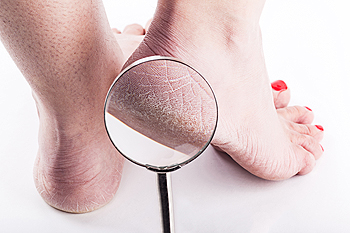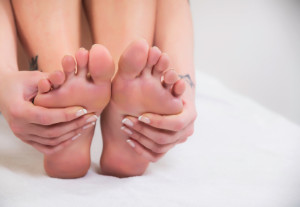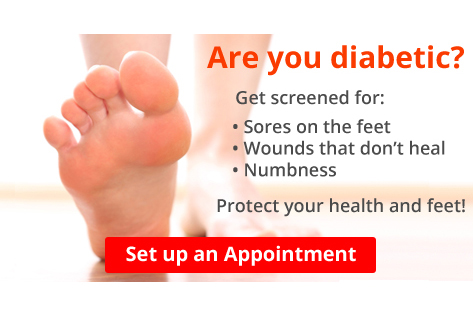August 2018
Causes of Cracked Heels
 Studies have shown that cracked heels are a common ailment for men and women of all ages. This problem may cause simple activities like walking to become difficult. If you are experiencing problems related to cracked heels, it is important that you seek treatment right away before your condition potentially progresses into eczema, or other types of inflammation. There are many different reasons why you may have cracked feet. Some common causes include obesity, aging, psoriasis, pregnancy, fungal infections, and vitamin deficiency. While these are not the only causes for cracked heels, these are some of the most common reasons why people develop them. Treatment for cracked heels typically begins with a good moisturizer. You can either opt for medicated solutions, or you can try to treat your cracked heels at home. Common household items that are used to treat dry feet are olive oil, coconut oil, and rice flour.
Studies have shown that cracked heels are a common ailment for men and women of all ages. This problem may cause simple activities like walking to become difficult. If you are experiencing problems related to cracked heels, it is important that you seek treatment right away before your condition potentially progresses into eczema, or other types of inflammation. There are many different reasons why you may have cracked feet. Some common causes include obesity, aging, psoriasis, pregnancy, fungal infections, and vitamin deficiency. While these are not the only causes for cracked heels, these are some of the most common reasons why people develop them. Treatment for cracked heels typically begins with a good moisturizer. You can either opt for medicated solutions, or you can try to treat your cracked heels at home. Common household items that are used to treat dry feet are olive oil, coconut oil, and rice flour.
If the skin on your feet starts to crack, you may want to see a podiatrist to find treatment. If you have any concerns, contact one of our podiatrists from University Foot and Ankle Center, L.L.C. Our doctors can provide the care you need to keep you pain-free and on your feet.
Cracked Heels
It is important to moisturize your cracked heels in order to prevent pain, bleeding, and infection. The reason cracked heels form is because the skin on the foot is too dry to support the immense pressure placed on them. When the foot expands, the dry skin on the foot begins to split.
Ways to Help Heal Them
- Invest in a good foot cream
- Try Using Petroleum Jelly
- Ease up on Soaps
- Drink Plenty of Water
Ways to Prevent Cracked Heels
- Moisturize After Showering
- Skip a Shower
- Keep Shower Water Lukewarm
- Don’t Scrub Your Feet
If you are unsure how to proceed in treating cracked heels, seek guidance from a podiatrist. Your doctor will help you with any questions or information you may need.
If you have any questions, please feel free to contact one of our offices located in East Brunswick and Monroe Township, NJ. We offer the newest diagnostic and treatment technologies for all your foot care needs.
Read more about Solutions for Cracked HeelsCauses of Cracked Heels
 Studies have shown that cracked heels are a common ailment for men and women of all ages. This problem may cause simple activities like walking to become difficult. If you are experiencing problems related to cracked heels, it is important that you seek treatment right away before your condition potentially progresses into eczema, or other types of inflammation. There are many different reasons why you may have cracked feet. Some common causes include obesity, aging, psoriasis, pregnancy, fungal infections, and vitamin deficiency. While these are not the only causes for cracked heels, these are some of the most common reasons why people develop them. Treatment for cracked heels typically begins with a good moisturizer. You can either opt for medicated solutions, or you can try to treat your cracked heels at home. Common household items that are used to treat dry feet are olive oil, coconut oil, and rice flour.
Studies have shown that cracked heels are a common ailment for men and women of all ages. This problem may cause simple activities like walking to become difficult. If you are experiencing problems related to cracked heels, it is important that you seek treatment right away before your condition potentially progresses into eczema, or other types of inflammation. There are many different reasons why you may have cracked feet. Some common causes include obesity, aging, psoriasis, pregnancy, fungal infections, and vitamin deficiency. While these are not the only causes for cracked heels, these are some of the most common reasons why people develop them. Treatment for cracked heels typically begins with a good moisturizer. You can either opt for medicated solutions, or you can try to treat your cracked heels at home. Common household items that are used to treat dry feet are olive oil, coconut oil, and rice flour.
If the skin on your feet starts to crack, you may want to see a podiatrist to find treatment. If you have any concerns, contact Genine Befumo, DPM from University Foot and Ankle Center, L.L.C. Our doctor can provide the care you need to keep you pain-free and on your feet.
Cracked Heels
It is important to moisturize your cracked heels in order to prevent pain, bleeding, and infection. The reason cracked heels form is because the skin on the foot is too dry to support the immense pressure placed on them. When the foot expands, the dry skin on the foot begins to split.
Ways to Help Heal Them
- Invest in a good foot cream
- Try Using Petroleum Jelly
- Ease up on Soaps
- Drink Plenty of Water
Ways to Prevent Cracked Heels
- Moisturize After Showering
- Skip a Shower
- Keep Shower Water Lukewarm
- Don’t Scrub Your Feet
If you are unsure how to proceed in treating cracked heels, seek guidance from a podiatrist. Your doctor will help you with any questions or information you may need.
If you have any questions, please feel free to contact our office located in Monroe Township, NJ . We offer the newest diagnostic and treatment technologies for all your foot care needs.
Causes of Ingrown Toenails
 A condition that is referred to as ingrown toenails commonly develops as a result of the toenails being trimmed incorrectly. This occurs when the corners of the nail grow into the skin, often producing pain and discomfort. There are several symptoms that may lead to the conclusion that an ingrown toenail has begun to form including redness and swelling around the affected area or a liquid discharge that comes from the nail. If the shoes that are worn fit poorly, this condition may begin to develop in addition to specific repeated activity, in which the toe consistently kicks a ball. The patient may find moderate relief by soaking the toe in warm salt water frequently throughout the day, in addition to inserting a small piece of dry cotton under the affected area. It’s strongly advised to consult with a podiatrist for correct treatment remedies that are right for you.
A condition that is referred to as ingrown toenails commonly develops as a result of the toenails being trimmed incorrectly. This occurs when the corners of the nail grow into the skin, often producing pain and discomfort. There are several symptoms that may lead to the conclusion that an ingrown toenail has begun to form including redness and swelling around the affected area or a liquid discharge that comes from the nail. If the shoes that are worn fit poorly, this condition may begin to develop in addition to specific repeated activity, in which the toe consistently kicks a ball. The patient may find moderate relief by soaking the toe in warm salt water frequently throughout the day, in addition to inserting a small piece of dry cotton under the affected area. It’s strongly advised to consult with a podiatrist for correct treatment remedies that are right for you.
Ingrown toenails can become painful if they are not treated properly. For more information about ingrown toenails, contact one of our podiatrists of University Foot and Ankle Center, L.L.C. Our doctors can provide the care you need to keep you pain-free and on your feet.
Ingrown Toenails
Ingrown toenails occur when a toenail grows sideways into the bed of the nail, causing pain, swelling, and possibly infection.
Causes
- Bacterial infections
- Improper nail cutting such as cutting it too short or not straight across
- Trauma to the toe, such as stubbing, which causes the nail to grow back irregularly
- Ill-fitting shoes that bunch the toes too close together
- Genetic predisposition
Prevention
Because ingrown toenails are not something found outside of shoe-wearing cultures, going barefoot as often as possible will decrease the likeliness of developing ingrown toenails. Wearing proper fitting shoes and using proper cutting techniques will also help decrease your risk of developing ingrown toenails.
Treatment
Ingrown toenails are a very treatable foot condition. In minor cases, soaking the affected area in salt or antibacterial soaps will not only help with the ingrown nail itself, but also help prevent any infections from occurring. In more severe cases, surgery is an option. In either case, speaking to your podiatrist about this condition will help you get a better understanding of specific treatment options that are right for you.
If you have any questions please feel free to contact one of our offices located in East Brunswick and Monroe Township, NJ. We offer the newest diagnostic and treatment technologies for all your foot and ankle needs.
Read more about Ingrown ToenailsCauses of Ingrown Toenails
 A condition that is referred to as ingrown toenails commonly develops as a result of the toenails being trimmed incorrectly. This occurs when the corners of the nail grow into the skin, often producing pain and discomfort. There are several symptoms that may lead to the conclusion that an ingrown toenail has begun to form including redness and swelling around the affected area or a liquid discharge that comes from the nail. If the shoes that are worn fit poorly, this condition may begin to develop in addition to specific repeated activity, in which the toe consistently kicks a ball. The patient may find moderate relief by soaking the toe in warm salt water frequently throughout the day, in addition to inserting a small piece of dry cotton under the affected area. It’s strongly advised to consult with a podiatrist for correct treatment remedies that are right for you.
A condition that is referred to as ingrown toenails commonly develops as a result of the toenails being trimmed incorrectly. This occurs when the corners of the nail grow into the skin, often producing pain and discomfort. There are several symptoms that may lead to the conclusion that an ingrown toenail has begun to form including redness and swelling around the affected area or a liquid discharge that comes from the nail. If the shoes that are worn fit poorly, this condition may begin to develop in addition to specific repeated activity, in which the toe consistently kicks a ball. The patient may find moderate relief by soaking the toe in warm salt water frequently throughout the day, in addition to inserting a small piece of dry cotton under the affected area. It’s strongly advised to consult with a podiatrist for correct treatment remedies that are right for you.
Ingrown toenails can become painful if they are not treated properly. For more information about ingrown toenails, contact Genine Befumo, DPM of University Foot and Ankle Center, L.L.C. Our doctor can provide the care you need to keep you pain-free and on your feet.
Ingrown Toenails
Ingrown toenails occur when a toenail grows sideways into the bed of the nail, causing pain, swelling, and possibly infection.
Causes
- Bacterial infections
- Improper nail cutting such as cutting it too short or not straight across
- Trauma to the toe, such as stubbing, which causes the nail to grow back irregularly
- Ill-fitting shoes that bunch the toes too close together
- Genetic predisposition
Prevention
Because ingrown toenails are not something found outside of shoe-wearing cultures, going barefoot as often as possible will decrease the likeliness of developing ingrown toenails. Wearing proper fitting shoes and using proper cutting techniques will also help decrease your risk of developing ingrown toenails.
Treatment
Ingrown toenails are a very treatable foot condition. In minor cases, soaking the affected area in salt or antibacterial soaps will not only help with the ingrown nail itself, but also help prevent any infections from occurring. In more severe cases, surgery is an option. In either case, speaking to your podiatrist about this condition will help you get a better understanding of specific treatment options that are right for you.
If you have any questions please feel free to contact our office located in Monroe Township, NJ . We offer the newest diagnostic and treatment technologies for all your foot and ankle needs.
Read more about Ingrown ToenailsHelpful Tips for Proper Foot Care
 Foot care is considered to be an essential part of one’s overall well-being, so it is crucial that you take precautions to care of your feet. Perhaps the most important tip to follow is to never ignore pain in your feet. As soon as you notice a substantial amount of pain in either of your feet, you should immediately contact your podiatrist. Another tip is to perform daily foot inspections, so you will be able to treat any issues before they progressively become worse. Additionally, it is important to practice proper hygiene and to wash your feet on a daily basis to ensure that you are not exposing yourself to harmful bacteria. The way you trim your toenails has an influence on whether or not you will develop painful ingrown toenails. The best way to trim your nails is to trim them straight across instead of in a rounded shape. For diabetics, it is especially important that you take care of your feet, because these ordinary foot conditions can easily become more serious.
Foot care is considered to be an essential part of one’s overall well-being, so it is crucial that you take precautions to care of your feet. Perhaps the most important tip to follow is to never ignore pain in your feet. As soon as you notice a substantial amount of pain in either of your feet, you should immediately contact your podiatrist. Another tip is to perform daily foot inspections, so you will be able to treat any issues before they progressively become worse. Additionally, it is important to practice proper hygiene and to wash your feet on a daily basis to ensure that you are not exposing yourself to harmful bacteria. The way you trim your toenails has an influence on whether or not you will develop painful ingrown toenails. The best way to trim your nails is to trim them straight across instead of in a rounded shape. For diabetics, it is especially important that you take care of your feet, because these ordinary foot conditions can easily become more serious.
Everyday foot care is very important to prevent infection and other foot ailments. If you need your feet checked, contact one of our podiatrists from University Foot and Ankle Center, L.L.C. Our doctors can provide the care you need to keep you pain-free and on your feet.
Everyday Foot Care
Often, people take care of their bodies, face and hair more so than they do for their feet. But the feet are a very important aspect of our bodies, and one that we should pay more attention to. Without our feet, we would not be able to perform most daily tasks.
It is best to check your feet regularly to make sure there are no new bruises or cuts that you may not have noticed before. For dry feet, moisturizer can easily be a remedy and can be applied as often as necessary to the affected areas. Wearing shoes that fit well can also help you maintain good foot health, as well as making it easier to walk and do daily activities without the stress or pain of ill-fitting shoes, high heels, or even flip flops. Wearing clean socks with closed shoes is important to ensure that sweat and bacteria do not accumulate within the shoe. Clean socks help to prevent Athlete’s foot, fungi problems, bad odors, and can absorb sweat.
If you have any questions please feel free to contact one of our offices located in East Brunswick and Monroe Township, NJ. We offer the newest diagnostic and treatment technologies for all your foot and ankle needs.
Read more about Everyday Foot CareHelpful Tips for Proper Foot Care
 Foot care is considered to be an essential part of one’s overall well-being, so it is crucial that you take precautions to care of your feet. Perhaps the most important tip to follow is to never ignore pain in your feet. As soon as you notice a substantial amount of pain in either of your feet, you should immediately contact your podiatrist. Another tip is to perform daily foot inspections, so you will be able to treat any issues before they progressively become worse. Additionally, it is important to practice proper hygiene and to wash your feet on a daily basis to ensure that you are not exposing yourself to harmful bacteria. The way you trim your toenails has an influence on whether or not you will develop painful ingrown toenails. The best way to trim your nails is to trim them straight across instead of in a rounded shape. For diabetics, it is especially important that you take care of your feet, because these ordinary foot conditions can easily become more serious.
Foot care is considered to be an essential part of one’s overall well-being, so it is crucial that you take precautions to care of your feet. Perhaps the most important tip to follow is to never ignore pain in your feet. As soon as you notice a substantial amount of pain in either of your feet, you should immediately contact your podiatrist. Another tip is to perform daily foot inspections, so you will be able to treat any issues before they progressively become worse. Additionally, it is important to practice proper hygiene and to wash your feet on a daily basis to ensure that you are not exposing yourself to harmful bacteria. The way you trim your toenails has an influence on whether or not you will develop painful ingrown toenails. The best way to trim your nails is to trim them straight across instead of in a rounded shape. For diabetics, it is especially important that you take care of your feet, because these ordinary foot conditions can easily become more serious.
Everyday foot care is very important to prevent infection and other foot ailments. If you need your feet checked, contact Genine Befumo, DPM from University Foot and Ankle Center, L.L.C. Our doctor can provide the care you need to keep you pain-free and on your feet.
Everyday Foot Care
Often, people take care of their bodies, face and hair more so than they do for their feet. But the feet are a very important aspect of our bodies, and one that we should pay more attention to. Without our feet, we would not be able to perform most daily tasks.
It is best to check your feet regularly to make sure there are no new bruises or cuts that you may not have noticed before. For dry feet, moisturizer can easily be a remedy and can be applied as often as necessary to the affected areas. Wearing shoes that fit well can also help you maintain good foot health, as well as making it easier to walk and do daily activities without the stress or pain of ill-fitting shoes, high heels, or even flip flops. Wearing clean socks with closed shoes is important to ensure that sweat and bacteria do not accumulate within the shoe. Clean socks help to prevent Athlete’s foot, fungi problems, bad odors, and can absorb sweat.
If you have any questions please feel free to contact our office located in Monroe Township, NJ . We offer the newest diagnostic and treatment technologies for all your foot and ankle needs.
Wounds that Don't Heal Need to be Checked
Wounds That Don't Heal Need to Be Checked
Blog Archives
- April 2024
- March 2024
- February 2024
- January 2024
- December 2023
- November 2023
- October 2023
- September 2023
- August 2023
- July 2023
- June 2023
- May 2023
- April 2023
- March 2023
- February 2023
- January 2023
- December 2022
- November 2022
- October 2022
- September 2022
- August 2022
- July 2022
- June 2022
- May 2022
- April 2022
- March 2022
- February 2022
- January 2022
- December 2021
- November 2021
- October 2021
- September 2021
- August 2021
- July 2021
- June 2021
- May 2021
- April 2021
- March 2021
- February 2021
- January 2021
- December 2020
- November 2020
- October 2020
- September 2020
- August 2020
- July 2020
- June 2020
- May 2020
- April 2020
- March 2020
- February 2020
- January 2020
- December 2019
- November 2019
- October 2019
- September 2019
- August 2019
- July 2019
- June 2019
- May 2019
- April 2019
- March 2019
- February 2019
- January 2019
- December 2018
- November 2018
- October 2018
- September 2018
- August 2018
- July 2018
- June 2018
- May 2018
- April 2018
- March 2018
- February 2018
- January 2018
- December 2017
- November 2017
- October 2017
- September 2017
- August 2017
- July 2017
- June 2017
- May 2017
- April 2017
- March 2017
- February 2017
- January 2017
- December 2016
- November 2016
- October 2016
- September 2016
- August 2016
- July 2016
- June 2016
- May 2016
- April 2016
- March 2016
- February 2016
- January 2016
- December 2015
- November 2015
- October 2015
- September 2015
- August 2015
- July 2015
- June 2015
- May 2015
- April 2015
- March 2015
- February 2015
- January 2015
- December 2014
- November 2014
- October 2014
- September 2014
- August 2014
- July 2014








